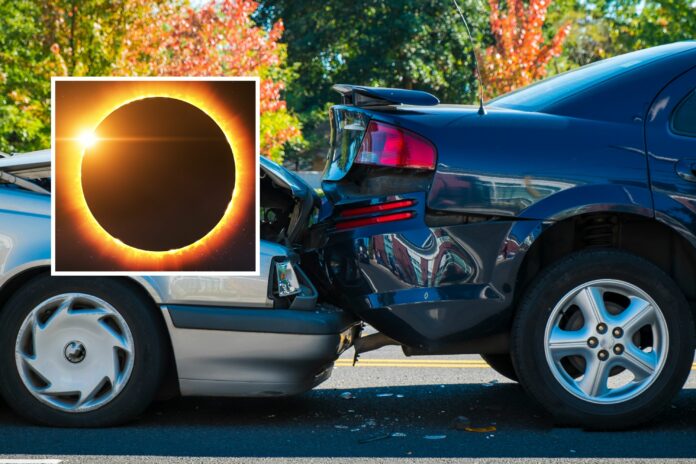Motorists may need to brace themselves for travel surrounding the upcoming April 8 total solar eclipse, as research has found that fatal collisions increased during the last eclipse that darkened U.S. skies.
There was a 31 percent rise in fatal traffic accidents during the 2017 total eclipse and in the days before and after it, according to a new research letter published this week in the journal JAMA Internal Medicine.
This was attributed primarily to an influx of people driving across the country to get a glimpse of the eclipse, the researchers say.
ISTOCK / GETTY IMAGES PLUS
The 2017 eclipse, which occurred on August 21, passed southeast from the Pacific Northwest down through South Carolina, while the 2024 eclipse will begin in Texas and pass over the Midwest and New England.
“For the eclipse on April 8th, totality will last for a maximum of 4 minutes and 27 seconds, although this will depend on where within the path someone is viewing it from. The duration of totality will vary slightly between the pacific coast of Mexico and Newfoundland in Canada,” Ryan Milligan, a lecturer in astrophysics at Queen’s University Belfast told Newsweek. “However, as the moon’s shadow is circular, it will also depend on how close one is to the center of the path. The closer to the middle, the longer it will be.”
The area of totality in 2017 was only around 70 miles wide, but the researchers found that road traffic fatality rates increased from an average of 7.9 per hour during the weeks before and after to 10.3 per hour on average in the three days spanning the eclipse.
“The 2017 total solar eclipse was widely anticipated because the path of totality (locations experiencing a total eclipse) fell within 300 miles of driving distance for a third of all individuals in the US. An estimated 20 million people in the US traveled away from home to another city to view the eclipse, resulting in substantial road traffic,” the authors wrote in the paper. “We hypothesized that the eclipse was associated with increased risks of a fatal traffic crash.”
Where will you be during the eclipses in 2023 and 2024?
This map shows the path of the Moon’s shadow as it crosses the contiguous U.S. during the eclipse on Oct. 14, 2023 and total solar eclipse on April 8, 2024. Will you get a chance to see them? https://t.co/mC7CagW0AR pic.twitter.com/wBA08oZ7k6
— NASA (@NASA) March 21, 2023
Therefore, rather than crashes increasing due to the momentary period of darkness caused by the total eclipse, the increased collisions may have been driven by the increase in the volume of drivers on the roads. This is a similar increase in traffic fatalities as seen on other days when many more people are driving, such as around Thanksgiving and other holidays like Memorial Day, or the July 4 weekend.
“In absolute terms, this averaged to 1 extra crash-involved person every 25 minutes and 1 extra crash fatality every 95 minutes,” the authors wrote.
They also found that the riskiest period on the roads were in the hours just after the totality, where there was a 50 percent higher risk than the average.
The researchers are concerned that a similar issue will be seen during the upcoming total solar eclipse on April 8, during which over 200 million people across the U.S. will be within driving range of the path of the totality.
Other factors involved in the increased deaths may have been traveling along unfamiliar routes, viewing the eclipse from unsafe roadside locations, and increased speeding to arrive at a viewing destination on time. Alcohol and drugs from celebratory events may also come into play.
The authors warn motorists to be safe in the days before and after the eclipse to avoid a repeat of 2017’s death rate spike.
“To help prevent another possible surge in traffic fatalities, clinicians might advise patients to respect speed limits, minimize distractions, allow greater headway, wear a seatbelt, and avoid driving while impaired. More broadly, stakeholders should work toward a transportation system that minimizes crash risks, tolerates human error, and optimizes recovery after a crash,” they wrote in the paper. “These population-based interventions may prevent eclipse-related fatalities and potentially save lives throughout the year.”
Do you have a tip on a science story that Newsweek should be covering? Do you have a question about traffic deaths? Let us know via [email protected].
Uncommon Knowledge
Newsweek is committed to challenging conventional wisdom and finding connections in the search for common ground.
Newsweek is committed to challenging conventional wisdom and finding connections in the search for common ground.


